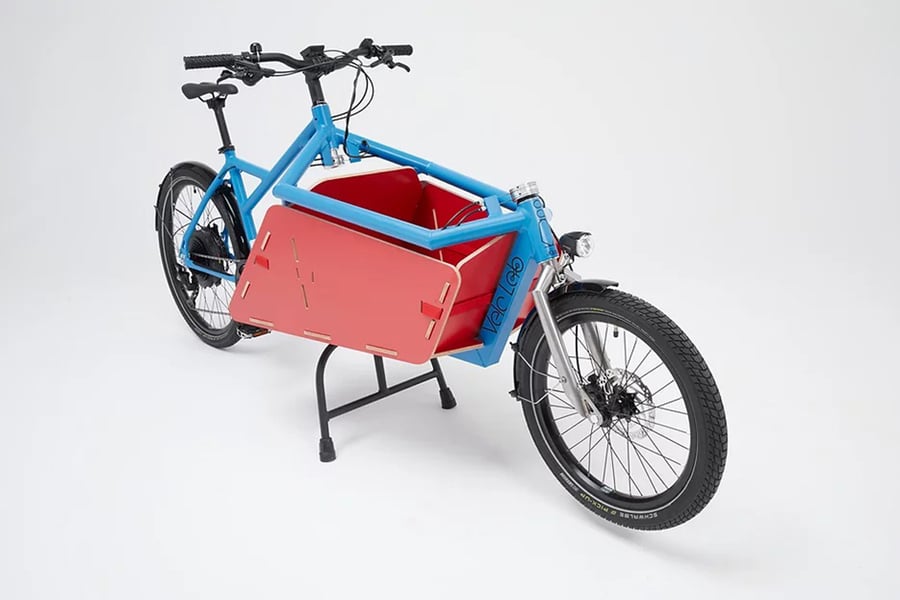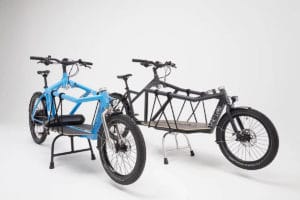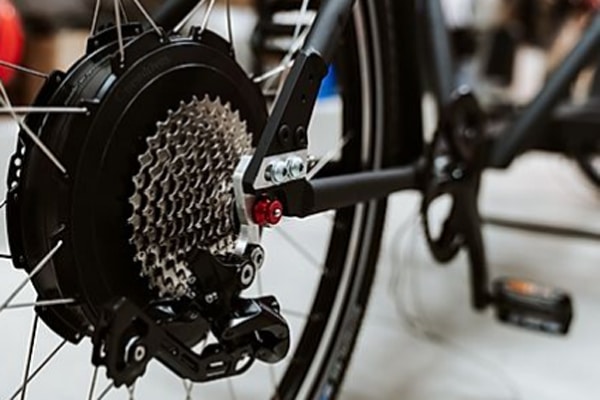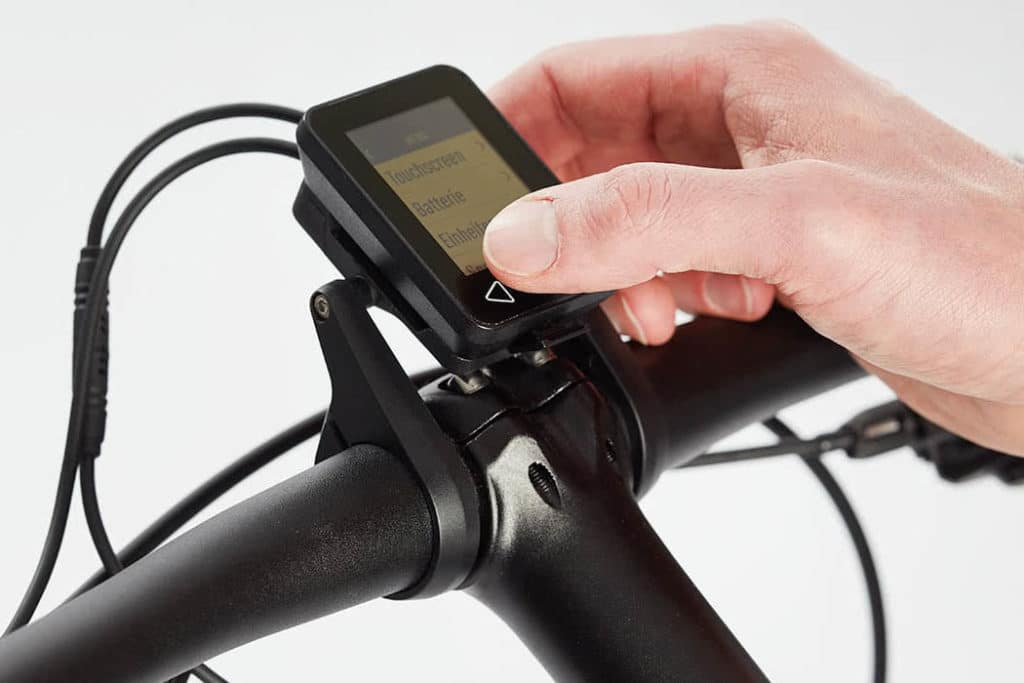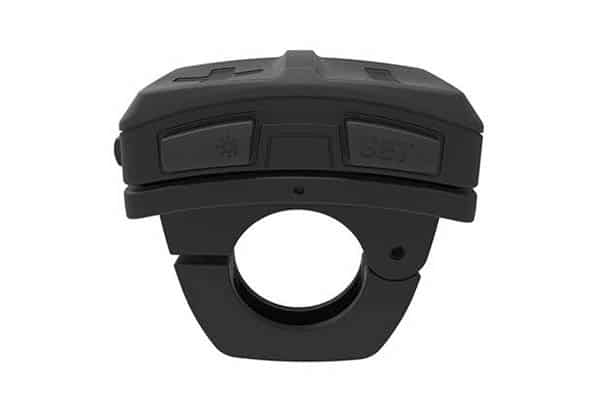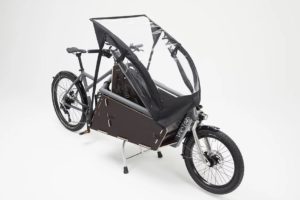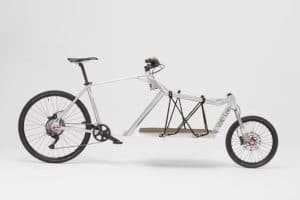Nowadays, you can hardly tell how much handicraft has gone into some bicycles. The Kàro from Velo Lab is definitely different. This bike exudes a lot of manufacturing flair. It is manufactured in small series. Relatively modest means are compensated for by company founder Efstathios Stasinopoulos and his comrades-in-arms with all the more passion for every detail. The result is inspired by outer space and has one or two other surprises in store.
However, the journey of Kàro did not start at a space base, but in the middle of the metropolis of Athens. Efstathios Stasinopoulos lived there until 2017. He actively participated in professionel road cycling for 15 years. Until the competitive athlete became a family man who was expecting his third child. Then he found himself wanting to live out his sporty attitude in everyday life – but couldn’t find a bike that suited his lifestyle.
The challenge of everyday life
Without further ado, the machine builder began to develop ideas for his own cargo bike. The Greek capital provided the requirement profile for this. It is surrounded by mountains and has serious elevations like the Lycabettus in its centre. Efstathios Stasinopoulos had a ten-percent climb waiting for him on his doorstep every day. A smooth uphill ride was therefore one of the essential requirements for his project, ideally paired with an appropriate off-road capability.
The third must was good manoeuvrability. Athens hardly has any bicycle infrastructure worth mentioning. Cyclists still have to fight for their place on the road. This means, for example, being able to ride when cars are forced to stop. So, when it comes to preparing a cargo bike for these conditions in the best possible way, dimensions and weight are crucial.
Opportunity instead of risk
Today, the requirements of that time stand out clearly. The frame of the bike follows the space design used in car racing, for example. For the material, Velo Lab opts for aluminium sourced from Greece. The construction accepts the limitations of this material. It is light, but not as resistant as steel, for example. This problem is solved by additional struts and very special angles of the individual frame tubes to each other. On the scales, this results in just 6.2 kilograms – a remarkable value for a cargo bike.
What’s more, the manufacturer makes the frame entirely in-house at its current headquarters in Bremen. It is from the Hanseatic city that Efstathios Stasinopoulos drives Velo Lab forward. Instead of the frame, it should more accurately read the frames. There are two versions of the Kàro. The Kàro Short has a ten centimetre shorter and narrower loading area than the Kàro Long. You can also choose from three frame sizes to find the one that suits you best. According to Velo Lab, the smallest size is suitable for people with a body length of up to 160 centimetres. Those who measure more than 190 centimetres should go for the XL version. However, both cost a 200 euros extra.

In the meantime, Velo Lab offers a variety of different attachments for the Kàro. Many of the boxes are made of wood.
Everything hangs on thin ropes
No matter what size, the head tube, which already ends just below the handlebar, is always conspicuous. It has made room for … well, for more space. As is well known, a head tube that reaches all the way to the bottom of the frame always limits the dimensions of the loading area to the rear. Here the tube is missing. Velo Lab uses the resulting free space to skilfully extend the load area towards the centre of the bike. On variants of the Kàro with electric assistance, this is one of the places where a battery can be accommodated.
So, if the head tube is virtually cut off, how does the steering work? The answer is: very elegantly. On the Kàro we once again encounter cable steering. This is nothing unusual for a cargo bike. Most of the time, however, the cables run under the cargo area and are not well protected from the weather and dirt. Velo Lab, however, runs most of the cables through the upper railing of the cargo area. At the front of the small steering tube in front of the cargo area as well as below the handlebars, two cable reels accommodate the steering cables. As a result, you get a virtually unlimited steering angle and thus an extremely small turning circle. We have not yet been able to ride the bike ourselves. From our experience, however, we expect a pleasantly direct steering feeling.
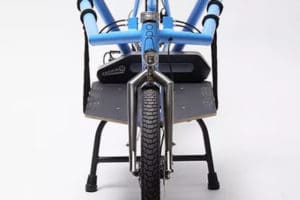
On the head tube of the fork, the cable reel of the cable steering is clearly visible. By the way, Velo Lab also manufactures the stainless steel fork completely in-house.
Drive made in Germany
When it comes to the e-drive, Velo Lab tries to stick to its basic ecological idea as much as possible. In addition to the aluminium from Greece, the sustainably cultivated organic wood from which various superstructures for the cargo bike are made, and the bicycle production in Bremen, there is Neodrives, a supplier that also manufactures almost entirely in Germany. Its Z20 motor is located in the rear wheel hub. As usual, it supports you up to a maximum speed of 25 km/h. This happens quite quickly, as the 40 Newton metres of torque act directly on the rear wheel axle and ensure very efficient propulsion.
- Z20 Neodrives motor
- Minimalist two inch display
- Wireless remote control unit for the e-drive
For building the bike of your dreams, Neodrives offers batteries in different sizes. For example, frame batteries are available that are mounted on the rear part of the cargo area. Alternatively, you can choose semi-integrated models that are embedded lengthwise in the floor of the cargo platform. The available capacity ranges from 500 to 630 watt-hours.
With regard to the non-electrical component of the drive, you have even more leeway. Velo Lab has thought of just about everything in the construction of the frame, including the dropouts. Consequently, everything from Pinion gears to Rohloff hub gears to any 12-speed derailleur is conceivable.
Spoilt for choice
With such variability, you can do nearly everything with the Kàro that is possible with a Longjohn cargo bike. The maximum permissible total weight of 180 kilograms only limits the maximum load at a late stage. The bike itself weighs only a few kilos. For a Kàro Long with a standard wooden cargo box and child seats, it’s just 28. In general, there are several other boxes to choose from, with and without the option for child seats, a huge canopy, various bags and inserts also custom-made by Velo Lab, and much more. The basic equipment includes a flat cargo platform that is bordered on the sides by straps. Depending on your needs, you will probably quickly consider some form of upgrade.
In terms of price, the journey would start at just over 5,200 euros for the Kàro Short with the drive from Neodrives. In the case of the Kàro Long, that’s only about 100 euros on top.
Hasn’t there been something like this before?
The Kàro may look familiar to some of you. You are absolutely right. The history of Efstathios Stasinopoulos also includes a partnership with Cargo Bike Monkeys. That ended a few years ago. That’s why you’ll find an almost identical bike at the manufacturer from Münster. The eRadlader is more or less the same as the motorised version of the Kàro Long.
Pictures: Velo Lab GmbH; Alber GmbH

